
The City of Paris just announced the winner of its ambitious Site Tour Eiffel Competition: the team led by London-based landscape architects Gustafson Porter + Bowman will be tasked to improve and reimagine the grounds around the city's most iconic landmark, just in time for the Paris 2024 Summer Olympics and Paralympics. The winning proposal "OnE I" was selected from a shortlist which also included AL_A Architects, KOZ-architectes, and Agence Ter.
"We would like to thank the City of Paris for having run a competition that has been engaging and educative, challenging and rewarding," GP+B responded to the winning announcement. "Thanks to an open and ongoing dialogue, the City has played an essential role in stimulating ideas and debate around the proposals for this site. We have never experienced such a resonsive approach to a competition."
Read on for the project summary from the designers.
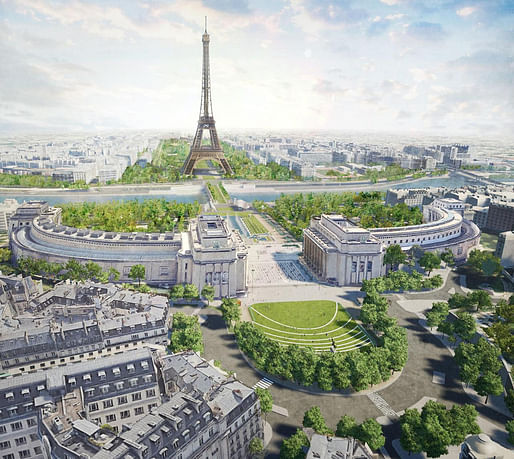
"Every year 30 million people visit the Eiffel Tower, situated at the heart of Paris. Seven million choose to ascend the monument for soaring views over the city. One of the most iconic landmarks in the world, the site is a victim of its popularity. Fundamental issues like over-crowding, impaired accessibility, lack of services, and congested gardens have impacted the experience of the Eiffel Tower and its surroundings."
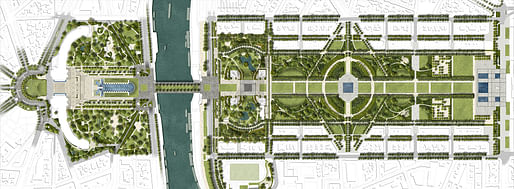
"The City of Paris shortlisted Gustafson Porter + Bowman –
alongside three other teams from 42 entries – to reimagine the
landscape of the Eiffel Tower. This major international competition
sought designs that would respond to the brief - discover,
approach, visit – and deliver a landscape that aligns with the
City’s vision for a resilient, inclusive and environmentally-oriented
future. The winning proposal, Gustafson Porter + Bowman’s OnE
scheme, envisions one readable landscape that reveals unity,
continuity and diversity."
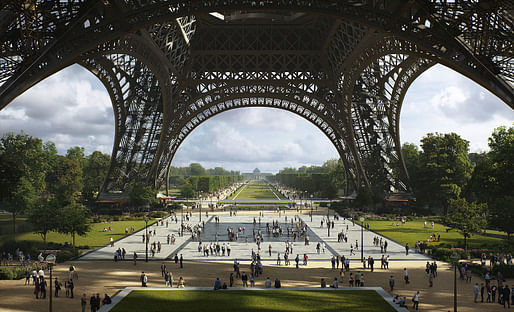
"OnE proposes a unifying axis: celebrating the Eiffel Tower at the
centre of a line that connects the Place du Trocadéro, the Palais
de Chaillot, the Pont d’Iéna, the Champ de Mars and the Ecole
Militaire. Along this central green axis, a series of reimagined
landscapes interlock: at the Place du Trocadéro, an amphitheatre
of greenery restores space to pedestrians; a new and enlivened
public space unfolds from the Varsovie Fountains towards the
Pont d’Iéna; the bridge is reincarnated as a green promenade
towards the gardens of the Eiffel Tower; the forecourt of the Eiffel
Tower caters to the crowds with additional services and facilities
discreetly hidden amongst the trees; and the raised lawns of the
Champ de Mars protect and elevate the landscape."
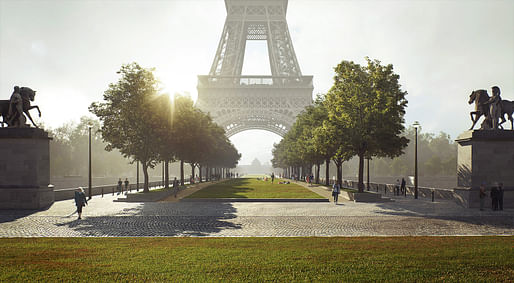
"OnE also creates spaces of pleasure and contemplation that punctuate the length of the site, and serve to prioritise the human scale. New perspectives are framed and staged, rebalancing the gravitational pull of the Eiffel Tower and activating a sense of arrival throughout. The OnE proposal establishes a coherent and refined hierarchy of uses across the site, improving pedestrian accessibility and city circulation."
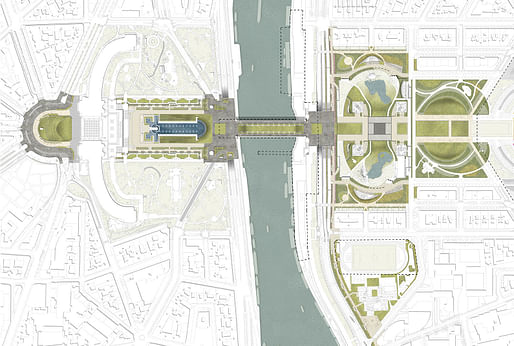
"OnE thus evokes the union of two historic landscape typologies: classical French gardens, characterized by major axes that express power; and French picturesque gardens, as places of artistic experimentation. In this urban landscape, green routes and gardens reserved for creative pursuits frame and soften the central axis. These “corridors” and “glades” introduce biodiversity, as well as areas for hosting temporary events. such as musical performances and sculpture exhibitions. Thus, OnE compresses into one word the idea and ideal of a unified space."
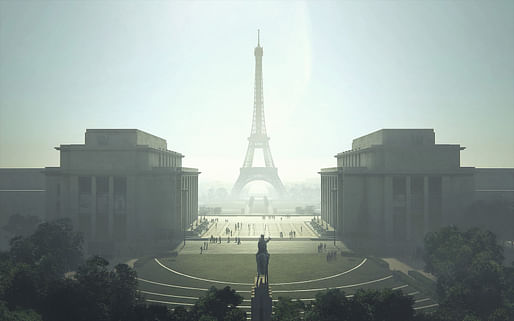
"Lastly, OnE embodies the international character of the site; it
connects not only the site from West (Trocadéro) to East (Joffre)
– the Ouest-Est / OnE represents the interconnections on this
site between the West and East of the world: one humanity, one
planet. Therefore, OnE encapsulates a unified environmental
approach towards the future. The City of Paris and the OnE
proposal represent the vanguard of instituting environmental
resilience into an urban context.
As part of the city’s showcase for the 2024 Olympic games, the
first phase of the redevelopment is to be completed by 2023."
The GP+B-led team also includes architects Chartier Corbasson, urban designers Sathy, engineering firm MA-Geo, legal and financial advisor Ariane Dienstag, and heritage architects Atelier Monchecourt, in addition to Devillers & Associates, 8’18, BIM Services, Gévolys, Area 17, Studio Brichet Ziegler, JML, YRIS Amo, Inex Sas, Bollinger + Grohmann, AVEL, ducks Scéno, Manifesto, SCO, SEMOFI, Sol Paysage, CDVIA, Movement Strategies, Professor Alain Bourdin, VPEAS, Deloitte and MIR.

2025 Steel Design Student Competition
Register by Wed, Apr 9, 2025
Submit by Wed, Jun 4, 2025

MICROHOME Kingspan 2024/25
Register by Thu, Feb 13, 2025
Submit by Tue, Mar 18, 2025
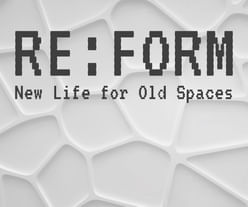
Re:Form – New Life for Old Spaces
Register by Wed, Jan 22, 2025
Submit by Tue, Sep 2, 2025
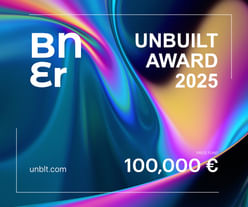
100,000 € Prize / Buildner's Unbuilt Award 2025
Register by Thu, Oct 30, 2025
Submit by Thu, Nov 20, 2025
2 Comments
really not surprised gp+b won. but they're being coy about the issues with site access around that absurd glass fence @ the eiffel tower base, and the lack of committed funding for the 2030 vision. nothing in the renders or site plan shows me they solved those issues...then again, the submission i worked on also ignored that part of the brief so...?